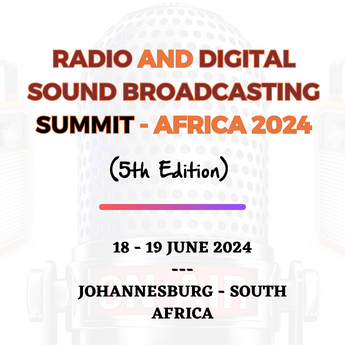
[This article is written in support of the forthcoming Radio and Digital Sound Broadcasting Summit – Africa 2024 coming up on 18 – 19 June 2024 in Johannesburg, South Africa. [Learn more about the event here]
AI (artificial intelligence) is fundamentally transforming radio broadcasting by offering unprecedented opportunities to enhance the listener experience. Through personalised content curation, continuous learning and adaptation, streamlined content production, interactive virtual hosts, and optimised advertising strategies, AI is ushering in a new era of immersive and interactive broadcasting and up-turning the way we engage with radio and sound broadcasting.
Here are some of the ways radio and digital sound broadcasters must take AI into account
- AI gets personalised content curation by:
- Utilising advanced algorithms to analyse listener preferences, behaviours, and demographics.
- Tailoring content delivery by suggesting specific shows, segments, or music playlists.
- Fostering deeper engagement and loyalty among listeners by catering to their interests and preferences.
- Continuous learning and adaptation: AI-powered recommendation systems evolve based on listener feedback and consumption patterns which in turn enables radio broadcasters to stay ahead of changing trends and preferences and be able to deliver content that remains relevant and compelling to the audience over time.
- Streamlined content production: AI’s Natural Language Processing (NLP) and speech recognition technologies automate the transcription of spoken content, which helps simplify the generation of written transcripts for various purposes, such as search engine optimisation and accessibility. This, in turn, enhances content archiving and facilitates engagement with hearing-impaired audiences.
- Interactive Virtual Hosts: AI-driven voice synthesis technologies create lifelike virtual radio hosts that can now interact with listeners in real-time, delivering personalised messages, weather updates, and news alerts.
- Optimised Advertising Strategies: AI and Machine learning algorithms analyse vast amounts of listener data to identify trends and patterns. This, in turn, enables more targeted and effective advertising campaigns, helping broadcasters and content publishers maximise advertising revenue while ensuring ads are relevant to listeners’ interests and preferences.
[This article is written in support of the forthcoming Radio and Digital Sound Broadcasting Summit – Africa 2024 coming up on 18 – 19 June 2024 in Johannesburg, South Africa. [Learn more about the event here]









